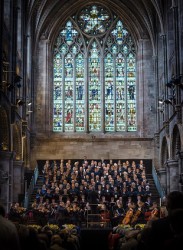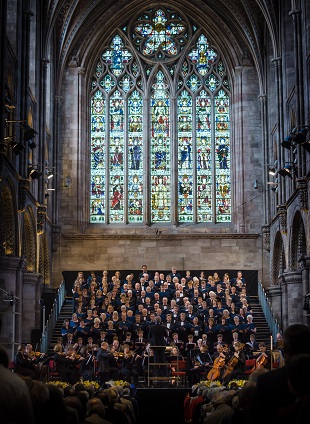
 United Kingdom Three Choirs Festival [6] – Vaughan Williams, Parry, Brahms: Elizabeth Watts (soprano); Matthew Brook (bass) Three Choirs Festival Chorus; Philharmonia Orchestra / Geraint Bowen (conductor). Hereford Cathedral, 4.8.2018. (JQ)
United Kingdom Three Choirs Festival [6] – Vaughan Williams, Parry, Brahms: Elizabeth Watts (soprano); Matthew Brook (bass) Three Choirs Festival Chorus; Philharmonia Orchestra / Geraint Bowen (conductor). Hereford Cathedral, 4.8.2018. (JQ)

Vaughan Williams – Toward the Unknown Region
Parry – Elegy for Brahms
Brahms – Ein deutsches Requiem
And so, we arrived at the closing concert of the 2018 Three Choirs Festival with a reflective programme of consolation. Introducing the concert, the Dean of Hereford announced the sad news of the death that morning of Dr Donald Hunt at the age of 88. A native of Gloucester, Dr Hunt had been inextricably linked with the Festival as a chorister and later assistant organist at the city’s cathedral and, most notably, during his time as Master of the Choristers and Organist at Worcester Cathedral (1976-96). In that capacity I believe he directed eight Three Choirs Festivals. I found myself remembering Dr Hunt also as Conductor of the Choral Society in my home town of Halifax; I attended quite a number of his performances in my teenage years. Fittingly, tonight’s performance of Ein deutsches Requiem was dedicated to his memory.
This Festival has frequently demonstrated Geraint Bowen’s skill as a programme planner. For this closing concert he had devised a programme of pleasing symmetry and one which, crucially, fitted together musically. We heard a fairly early choral work by Vaughan Williams, a Parry pupil, followed by Parry’s tribute to Brahms, after which the music of Brahms himself occupied the second half of the concert. A further link was provided by Stanford, who, like Parry, taught VW composition: it was he who conducted the first London performance of Toward the Unknown Region and the very first performance of Elegy for Brahms.
Toward the Unknown Region dates from 1907. It received its first performance that year at the Leeds Festival where, three years later, A Sea Symphony would be unveiled. Both scores set words by VW’s beloved poet, Walt Whitman and, indeed, in many ways Toward the Unknown Region can be seen as pre-figuring the symphony. That applies not just to the choice of poet or the harmonic language but also – crucially – to the sense of vision that informs both scores. I was a bit disappointed by the start of this performance. Both the orchestral opening and the choir’s first entry are marked piano. Indeed, everything is marked p or pp until the choir sings ‘nor touch of human hand’. At best, this performance achieved no quieter dynamic than mp and I think Geraint Bowen should have insisted on softer dynamics. As it was, there was no real sense of mystery in the first pages. Later, however, things improved and ‘Then we burst forth’ blazed excitingly. From here to the end the music swept forward like a tide in full spate, just as VW surely intended.
Parry had a great respect for Brahms. As Gwilym Bowen observed in the programme notes, ‘Brahms was to Parry a model artist, balancing passion with integrity of technique and ideals’. The Elegy was composed in 1897, immediately following Brahms’ death, but it was not performed until Stanford conducted it in November 1918 at a memorial concert for Parry himself. I’m not sure if the piece has previously been aired at Three Choirs. I think I’m right in saying that Stanford revised the score for that 1918 performance, though I don’t know how extensively he did so. Thereafter the work seems to have sunk without trace until the original version was resurrected in the 1970s. I don’t know which version was heard in this concert.
The piece, which is in essence a symphonic movement, is not as deeply elegiac as, say, the second movement of Elgar’s Second Symphony, and it contains some passages that are pretty urgent in nature; these came off well in Geraint Bowen’s performance. That said, there’s no doubting the depth of Parry’s respect for Brahms in this short musical tribute. It seemed to me, perhaps wrongly, that Geraint Bowen didn’t invest the first few minutes with the gravitas that one can hear in Sir Adrian Boult’s 1979 premiere recording of the Elegy. However, in the last few minutes both work and performance attained a genuine nobility of utterance that amply vindicated the inclusion of the Elegy in this programme. It was good to hear it, especially since the Philharmonia played it so well.
This may well have been the first hearing of Parry’s Elegy at Three Choirs and I think it was not until 1980 that Toward the Unknown Region achieved a Three Choirs performance despite VW’s close association with the Festival. By contrast the first Three Choirs performance of Ein deutsches Requiem was, I believe, at the 1893 Worcester Festival and there have been quite a few performances since then. Tonight, we heard a very fine account of it
The performance benefitted enormously from the involvement of two of the best soloists I’ve heard all week. Matthew Brook was excellent. He has the physical bearing for this role, which helps, but the most important thing was the high quality of his singing. In both his solos we heard an imposing, firm and very well controlled voice, all of which meant that his delivery of both words and music was highly convincing. I admired also his legato, not least in the passage beginning at ‘Ach, wie gar nichts’ in the third movement. In his second solo he was commanding as he paved the way for the chorus to sound the Last Trumpet. I was no less taken with Elizabeth Watts. Her account of ‘Ihr habt nun Traurigkeit’ was quite lovely. Her silvery tone was a delight to hear and I appreciated very much her command of line. It was abundantly evident that she was feeling the music deeply yet all this was conveyed simply through her voice without any resort to distracting physical mannerisms. Her performance was intense yet poised and left me regretting that Brahms restricted his soprano to just one appearance. Miss Watts was by some distance the best soprano soloist I heard all week.
At the end of what must have been a tiring and demanding week the Festival Chorus showed no sign of flagging. The warm weather we’ve enjoyed – or, at times, endured – this week can’t have created ideal conditions for choral singing but the Chorus has performed nobly. Tonight, they gathered themselves for one last effort – and they delivered. If I were being hypercritical I might regret the absence of genuinely quiet singing in some passages, such as in ‘Wie lieblich sind deine Wohnungen’, but that was greatly outweighed by the firm and excellent tone with which the choir sang from start to finish. Their delivery of the big, challenging fugues was excellent and their German diction was admirably clear. At the dramatic point where the Last Trump sounds (’Denn es wird die Posaune schallen’) I relished the choir’s attack and the way they sustained the power in Brahms’ writing. This performance was a fine achievement and a great way for the ‘Class of 18’ to sign off.
At every turn the singers were aided and abetted by lustrous and finely-honed playing from the Philharmonia who, like the Festival Chorus, tonight maintained the fine form they’ve displayed throughout the week.
Geraint Bowen conducted the work well. The first movement was sensibly paced so that the music had due solemnity but was not in any way lachrymose. That set the tone for the rest of the performance in which almost without exception the tempi were judiciously chosen, recognising that this is a Requiem of consolation. In movement III the fugue at ‘Der Gerechten Seelen sind in Gottes Hand’ was taken at quite a lick. That was the right approach, as it avoided heaviness, but in this resonant acoustic there was a trade-off. Despite the choir’s best efforts, the music sounded somewhat generalised. At the beginning of the final movement (‘Selig sind die Toten’) I would have liked Mr Bowen to have given the music just a bit more breadth but later in the same movement the wonderful passage ‘Ja, der Geist spricht’ was expertly and atmospherically handled. Mr Bowen’s performance of Ein deutsches Requiem was suitably reflective – and dramatic in one or two places – but not at all mournful – and I enjoyed it very much. It was a distinguished conclusion to the festival and I’m sure Donald Hunt would have approved.
This concert brought to an end the 2018 Three Choirs Festival. I’ve only been able to attend a fraction of the 80-plus events but the concerts I’ve heard have all been very good indeed and anecdotally I hear that the wider Festival has been very successful. There’s been a great deal to admire and enjoy in the performances that I’ve heard. Plaudits must go principally to the twin backbones of the evening concerts: the Festival Chorus and the Philharmonia. Both choir and orchestra have done a marvellous job and given a great deal of pleasure through their performances.
Next year everything moves by rotation to Gloucester where the Festival will take place between 26 July and 3 August 2019. Artistic Director Adrian Partington has announced the key details of the programme and a mouth-watering prospect it looks. Major events will include – in chronological order: Merton College Choir in Sir James MacMillan’s Seven last Words from the Cross; Berlioz’s La Damnation de Faust; the Verdi Requiem (conducted by Edward Gardner); Rachmaninov’s All-Night Vigil (Ex Cathedra); a revival of John Joubert’s An English Requiem, a Festival commission from 2010 (review); the UK concert premiere of Mendelssohn’s rarely-heard but fascinating arrangement of Handel’s Israel in Egypt (more details here); the premiere of a Festival commission, A Christmas Oratorio by Bob Chilcott; Vaughan Williams’ A Sea Symphony; and Beethoven’s Symphony No 9. There’ll be song recitals by Joshua Ellicott, James Gilchrist and Roderick Williams; and John Scott Whiteley’s organ recital will include the premiere of a new commissioned work by Sir James MacMillan. All this, as they say, and much, much more. The full programme will be announced on 22 March 2019. For more information see the Festival website.
John Quinn
